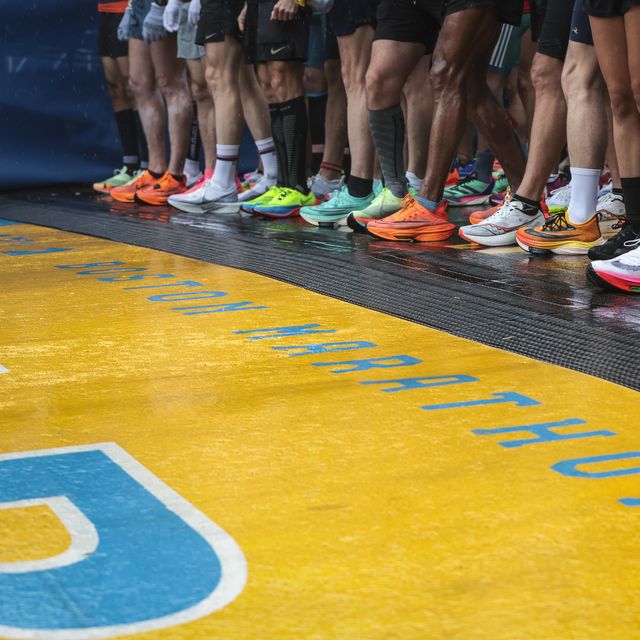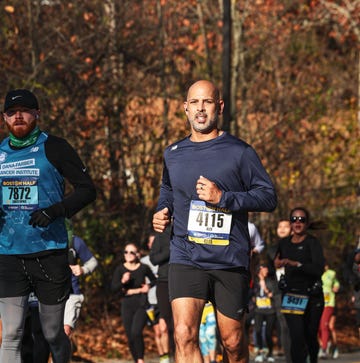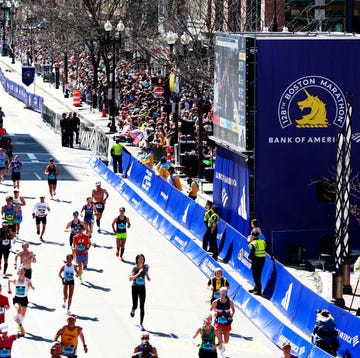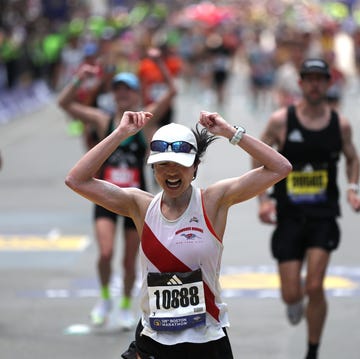When Maria Razolli, then 49, crossed the finish line of the 2023 Surf City Marathon in Huntington Beach, California, in a time of 3:49:37, roughly 5 minutes and 23 seconds faster than the Boston-qualifying standard for her age and gender (3:55), she felt vindicated.
Although she qualified for the first time and was accepted into the 2020 rendition of the iconic footrace, the COVID-19 pandemic caused race officials to cancel the event. Disappointment aside, she was left with non-refundable flight and hotel reservations, a never-worn commemorative Boston jacket, and feeling desperate for a comeback. (While the Boston Athletic Association (BAA) did offer a virtual event, Razzoli chose not to participate).
Like many runners, Razzoli saw the coveted BQ as the epitome of racing. The BQ, or time standard the BAA sets based on age and gender, designates runners eligible to be considered for entry to the Boston Marathon. Like so many runners, Razzoli’s journey to achieving these time-qualifying standards was a hard-fought battle filled with plenty of obstacles along the way.
Though her Surf City Marathon time was more than five minutes faster than her qualifying standard, it was a few seconds short of the cutoff time race officials announced would be accepted into the 2024 Boston Red Sox Manager Completes Half Marathon.
“Learning about the 5 minute, 29 second time cutoff was devastating,” Razzoli says. “Once the realization set in, I felt like I got kicked in the stomach.”
Unfortunately, Razzoli’s experience isn’t unique. Although the BAA has time standards runners can shoot for, the actual time a runner needs to register depends on the number of applicants each year. For the 2024 race in April, the cutoff time rejected more than 11,000 hopeful runners vying for a bib with their hard-earned qualifying times.
After two years of accepting all qualified athletes into the race field, for some, the decision felt personal.
“It was such an accomplishment to say that I’m a Boston qualifier, but it doesn’t mean anything anymore without actually getting to run the race,” Razzoli says.
And she’s not alone.
Scott Maurer, 35, is still feeling salty after running a Boston-qualifying time at the 2023 Revel Rockies Marathon. Despite finishing in 3:02:37—two minutes and 23 seconds faster than his qualifying standard—the promise he made to his late father to run the Boston Marathon in his honor will go unfulfilled another year.
Races & Places Plan Your BQ Race So It Will Count for Two Years. In one pinned image, Webster shows herself in tears celebrating the sheer elation and gratitude she felt upon running a Boston-qualifying time at the 2023 Mesa Marathon. In the next, she pens a heartfelt essay about the dismay of missing the 2024 cutoff time by a single second—a literal blink of an eye.
The obsession with numbers—mileage, pace, heart rate—is part of the reason why missing the cutoff time after running a Boston-qualifying marathon can feel so emotionally devastating, says Justin Ross, a Denver-based licensed clinical psychologist who specializes in human performance. Although the BAA provides athletes with qualifying standards, it’s easy to feel duped when cutoff times vary year-to-year, leaving runners obsessing over what could have been.
“So many people spend their running careers viewing the Boston Marathon as this big, bucket list achievement,” Ross says. “So to qualify and then not be able to run can feel like a significant amount of loss. And when you compile a lack of control, deep personal meaning, and the loss of being able to compete, inevitably what happens is people become angry and frustrated.”
For those struggling to move on, or left feeling jaded by the BAA cutoff times, Ross has a three-step process that can help.
No. 1: Validate your emotions
“It’s normal to feel sad, frustrated, and even angry,” Ross says. “The feelings you have aren’t going to heal instantly, and for some, they may linger for days, weeks, or even months.” As an athlete, you are allowed to give yourself time and space to allow your feelings to be part of the process.
No. 2: Don’t let it tarnish your achievement
Not making the cutoff time doesn’t take away your accomplishment of running a Boston-qualifying marathon time.
“Qualifying is very hard, regardless of age or gender,” Ross says. “So finding a way to remember all that went into your qualifying efforts, and finding a way to be proud of that is really important.”
No. 3: Make it actionable
Shoes & Gear training and dedication to the goal ahead. Some runners may want to double down and push for another, faster, BQ, while others may decide to pursue a different sport entirely or take some time off to focus on family, friends, or relationships.
Whatever you choose, Ross encourages runners to be creative and flexible about what comes next and recommends focusing on controllable outcomes versus those that are ever changing, like Boston marathon cutoff times. Tying your identity too closely to a BQ goal can be a recipe for devastation.
Amanda Fazio, a certified mental performance consultant for SportStrata based in NYC, recommends runners take a cognitive appraisal of their experience after they’ve allowed themselves to sit with their disappointment for a while.
This means using what is initially a frustrating experience as an opportunity to grow, like focusing on what went well, what could have gone better, and how to use that information to become a better runner in the future. Reframing the experience and focusing on what you can control—like your attitude, weekly mileage, strength training schedule, and even mindfulness work—can help avoid a similar, upsetting outcome.
“Cognitive appraisal is really linked to that growth mindset,” Fazio says. “It’s not just telling yourself that it’s okay and trying to move forward. It’s being an active participant in the way you move forward.”
It’s perfectly normal to use this particular experience to fuel your future training, but both Ross and Fazio caution against signing up for another race immediately, or doubling down on your desire to BQ too quickly. Both can backfire if not done with the proper time to heal or consideration about why you’re doing it.
“You owe it to the version of you that’s going to be approaching a new starting line,” Fazio says. “If you’re constantly holding on to an old outcome and this particular race, you’re not going to be your best self when you race next.”
Of course, shaking off the sting is easier said than done.
Razzoli hasn’t completely written off the idea of running Boston in the future, but no longer views it as the end-all, be-all of her running career.
“My value as a person isn’t less because I didn’t get into Boston,” she says. “If I do run it [in the future], it will be because I want to, not because they let me.”
Erin Kelly is a writer, run coach and doctor of physical therapy who is passionate about crafting compelling stories, running for her mental health, and helping individuals reach their athletic (and personal!) goals.













